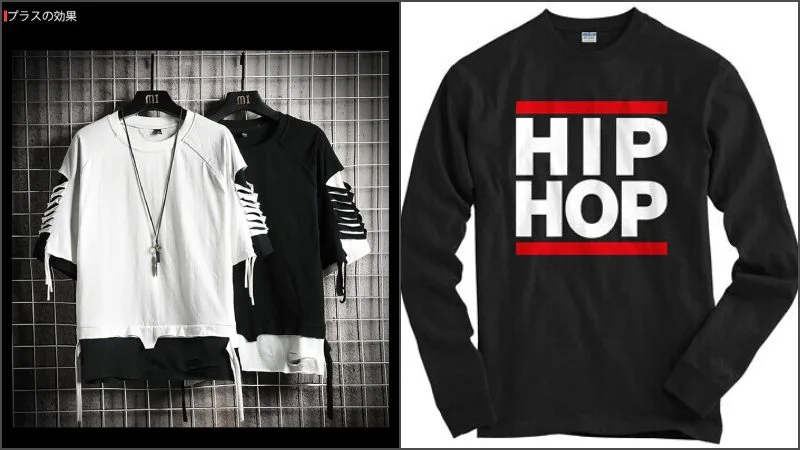Hip hop culture has long been recognized as a powerful force of expression, embodying the struggles, triumphs, and creativity of marginalized communities. While music, dance, and graffiti are often celebrated as integral components of this cultural movement, one often overlooked aspect is the role of fashion, particularly hip hop shirts.
These garments serve as more than mere clothing items; they are symbols of identity, solidarity, and resistance. This article explores the significance of hip hop shirts as a form of expression, delving into their history, cultural impact, and evolving styles.
The Roots of Hip Hop Fashion
Origins in Street Culture
- Hip hop fashion emerged in the late 1970s and early 1980s within the streets of New York City, primarily in the Bronx and Harlem.
- Influenced by the socio-economic conditions of urban neighborhoods, hip hop fashion was born out of necessity and creativity.
Reappropriation of Mainstream Brands
- Early hip hop artists repurposed mainstream brands like Adidas, Nike, and Puma, transforming them into symbols of urban identity and style.
- This reappropriation challenged mainstream fashion norms and empowered marginalized communities to assert their cultural significance.
The Evolution of Hip Hop Shirts
Graphic Design and Artistic Expression:
- Hip hop tshirts are characterized by bold graphic designs, vibrant colors, and provocative imagery.
- Artists and designers use shirts as canvases to convey political messages, celebrate cultural icons, and express individuality.
Influence of Music and Lyrics
- Many hip hop shirts feature lyrics, album covers, or portraits of influential artists, serving as a homage to the genre’s musical roots.
- These shirts become a way for fans to connect with their favorite artists and express their musical preferences.
Collaborations and Limited Editions
- Collaborations between hip hop artists and fashion brands have become increasingly common, resulting in limited edition shirt releases.
- These collaborations often blend streetwear aesthetics with high fashion elements, attracting a diverse audience of fashion enthusiasts and music fans alike.
Hip Hop Shirts as a Form of Resistance
Subversion of Mainstream Culture
- Hip hop shirts challenge mainstream fashion norms by embracing alternative styles and cultural references.
- They represent a form of resistance against the homogenization of fashion and the erasure of marginalized voices.
Empowerment and Representation
- For marginalized communities, hip hop shirts serve as a means of empowerment and representation, allowing individuals to reclaim their identities and narratives.
- They provide a platform for expression and visibility in a society that often marginalizes or stereotypes urban youth and communities of color.
Exploring Hip Hop Shirt Subgenres
Streetwear Culture
- Streetwear brands have become synonymous with hip hop fashion, with brands like Supreme, BAPE, and Palace leading the charge.
- Hip hop shirts within the streetwear subgenre often feature minimalist designs, oversized fits, and limited edition releases, catering to a niche audience of collectors and enthusiasts.
Retro Revival
- Nostalgia plays a significant role in hip hop fashion, with many designers drawing inspiration from vintage styles and cultural references from the 80s and 90s.
- Retro hip hop shirts often feature throwback graphics, bold typography, and references to iconic hip hop albums and films, appealing to fans of all ages.
Political and Social Commentary
- Hip hop has always been a platform for social and political commentary, and hip hop shirts are no exception.
- Shirts within this subgenre feature powerful messages, protest slogans, and imagery that address issues such as police brutality, racial inequality, and systemic oppression, amplifying the voices of marginalized communities.
The Rise of DIY Culture
Customization and Personalization
- DIY hip hop shirts allow individuals to customize their clothing, adding personal touches and unique designs that reflect their individuality.
- Techniques such as screen printing, embroidery, and fabric painting are commonly used to create one-of-a-kind pieces that stand out from mass-produced garments.
Community Engagement
- DIY hip hop shirt workshops and events provide a platform for community engagement and creative expression.
- These spaces foster collaboration, skill-sharing, and empowerment, allowing participants to connect with like-minded individuals and celebrate their cultural heritage.
Fashion as a Form of Activism
Collaborations with Social Justice Organizations
- Many hip hop artists and fashion brands have partnered with social justice organizations to raise awareness and funds for important causes.
- Collaborative shirt releases often donate a portion of proceeds to charity or support grassroots movements, demonstrating the power of fashion as a tool for activism.
Intersectionality and Inclusivity
- The intersectionality of hip hop culture intersects with other social movements, such as feminism, LGBTQ+ rights, and environmental justice.
- Hip hop shirts that promote inclusivity and diversity celebrate the multiplicity of identities within the hip hop community and advocate for social change.
Looking Towards the Future
Sustainability and Ethical Fashion
- As awareness of environmental and labor issues grows, there is a growing demand for sustainable and ethically-made hip hop shirts.
- Fashion brands are increasingly adopting eco-friendly practices, such as using organic materials, minimizing waste, and supporting fair labor standards, to meet the needs of conscious consumers.
Technology and Innovation
- Advancements in technology, such as digital printing and 3D modeling, are revolutionizing the way hip hop shirts are designed and produced.
- Virtual try-on tools and augmented reality experiences are enhancing the online shopping experience, allowing customers to visualize how shirts will look and fit before making a purchase.
Conclusion
Hip hop shirts continue to evolve and adapt to changing cultural and social landscapes, serving as a canvas for artistic expression, political activism, and community engagement.
As we look toward the future, it is clear that hip hop fashion will remain a driving force of creativity and innovation, shaping the way we express ourselves and connect through clothing.
